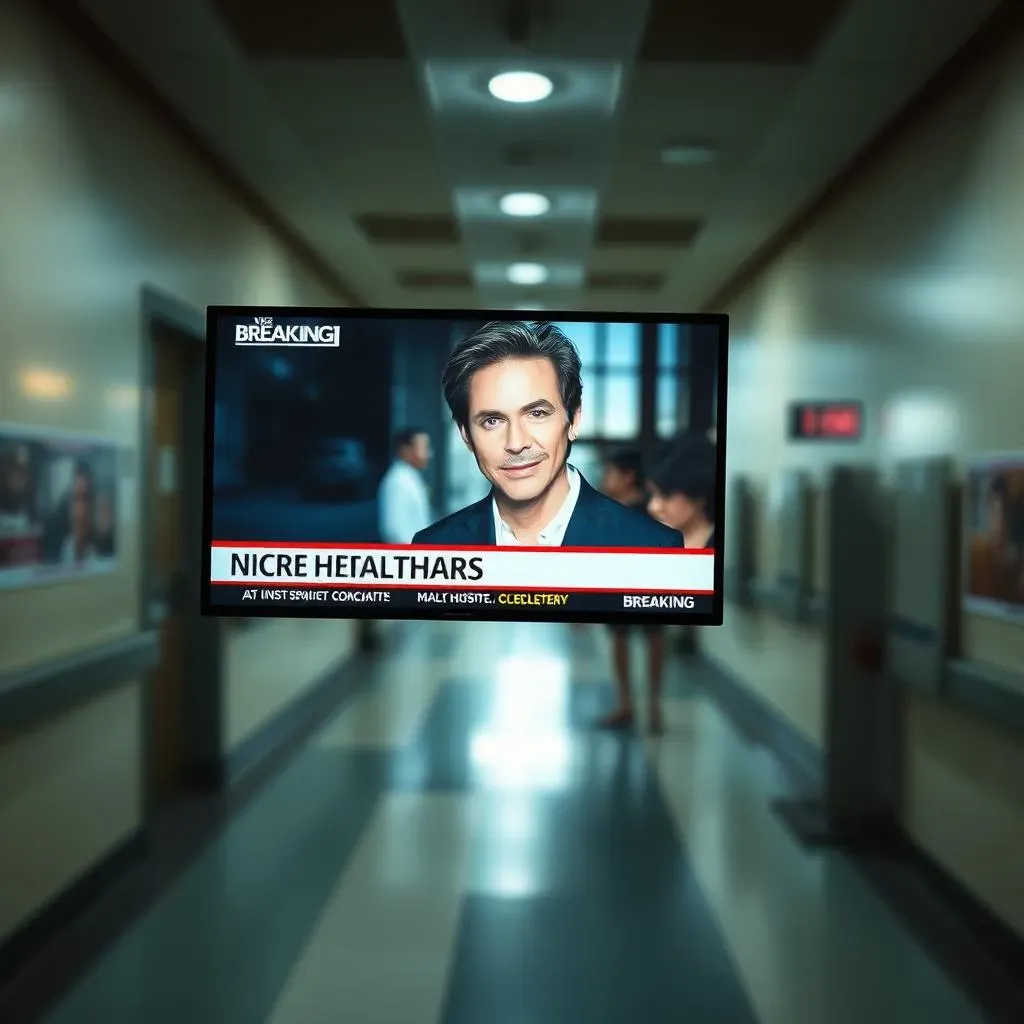Table of Contents
We all love a good celebrity gossip story, right? But when it comes to the health of our favorite stars, things get a little more serious. This article dives into the world of celebrity health scares updates, exploring recent events and what they mean for both the individuals involved and the public's perception of health and wellness. We'll examine some of the biggest celebrity health scares updates that have made headlines, analyzing the trends and discussing the broader impact of these events. Are there common threads? How do these stories influence our own health choices? Beyond the headlines, we’ll also point you towards valuable resources and support networks. Whether you're a devoted fan or simply curious about celebrity health scares updates, this exploration promises to be both informative and thought-provoking. Get ready to uncover the stories behind the news and discover how these events shape our understanding of health and well-being in the public eye. Let's get started with the latest celebrity health scares updates.
Recent Celebrity Health Scares Updates

Recent Celebrity Health Scares Updates
High-Profile Cases in 2024
The year 2024 has already seen its share of unsettling celebrity health scares. One prominent example involved actor Jamie Foxx, whose sudden hospitalization sparked widespread concern and speculation. While details remained initially scarce, the subsequent release of information shed light on the severity of his condition, highlighting the unpredictable nature of health crises, even among seemingly healthy individuals. The public outpouring of support underscored the profound impact celebrities have on our lives, extending beyond entertainment into realms of empathy and shared human experience. This case served as a stark reminder that health can change unexpectedly, regardless of fame or fortune.
Beyond Foxx, other celebrities faced health challenges that made headlines. These events, while sometimes shrouded in privacy, offer a glimpse into the vulnerability of public figures and the pressures they face to maintain a flawless public image. It's a reminder that even those who appear to have it all can experience significant health setbacks, highlighting the importance of prioritizing well-being above all else. The media frenzy surrounding these events often obscures the human element, leaving us to ponder the complexities of fame, health, and privacy.
Celebrity | Health Issue (Reported) | Public Response |
|---|---|---|
Jamie Foxx | Medical emergency requiring hospitalization | Widespread concern and support |
[Insert another celebrity example] | [Insert reported health issue] | [Describe public reaction] |
The Impact of Social Media
Social media has undeniably amplified the impact of celebrity health scares updates. News spreads rapidly, often before official statements are released, leading to a whirlwind of speculation, misinformation, and emotional responses from fans and the public at large. The immediacy of social media can be a double-edged sword. While it allows for rapid dissemination of information (and sometimes support), it also creates fertile ground for rumors and anxieties to spread unchecked. Responsible reporting and fact-checking become crucial in navigating this landscape.
The constant flow of updates, often fueled by unofficial sources, can contribute to a sense of heightened anxiety and uncertainty. Fans grapple with incomplete information, relying on fragmented news snippets and social media posts to piece together a narrative. This can lead to emotional distress, particularly for those who deeply admire or connect with the affected celebrity. The challenge lies in finding a balance between the public's right to know and the need to respect the privacy and dignity of those experiencing health challenges.
- Rapid spread of information, both accurate and inaccurate
- Increased anxiety and speculation among fans
- Potential for misinformation and harmful rumors
- Challenges in balancing public interest and privacy
Analyzing Celebrity Health Scare Trends and Impacts

Analyzing Celebrity Health Scare Trends and Impacts
The Rise of Mental Health Awareness
One striking trend in recent celebrity health scares updates is the increased focus on mental health. Celebrities are increasingly open about their struggles with anxiety, depression, and other mental health conditions. This openness helps reduce the stigma surrounding mental illness, encouraging others to seek help and fostering a more compassionate understanding. The willingness of these public figures to be vulnerable is a significant step towards normalizing mental health conversations and promoting the importance of seeking professional support. It's a powerful message that resonates far beyond the entertainment industry.
However, the intense media scrutiny that accompanies these disclosures can also present challenges. The pressure to maintain a perfect image can make it difficult for celebrities to prioritize their mental well-being, potentially exacerbating existing issues. The delicate balance between sharing personal experiences and protecting one's privacy remains a significant consideration. It's a complex issue with both positive and negative aspects.
Celebrity | Mental Health Issue (Discussed Publicly) | Impact on Public Perception |
|---|---|---|
[Example Celebrity 1] | [Specific Mental Health Condition] | [Positive/Negative Impact, explain briefly] |
[Example Celebrity 2] | [Specific Mental Health Condition] | [Positive/Negative Impact, explain briefly] |
The Impact on Public Health Discourse
Celebrity health scares updates often spark wider conversations about public health. When a high-profile individual experiences a health crisis, it can bring attention to specific conditions, preventative measures, and the importance of early detection and treatment. This increased awareness can motivate individuals to take proactive steps towards improving their own health, leading to positive changes in lifestyle choices and healthcare seeking behaviors. The ripple effect of these events can be significant, influencing public health policy and resource allocation.
Conversely, the media's portrayal of these events can sometimes be misleading or overly sensationalized. This can lead to misconceptions and anxieties, particularly if information is incomplete or inaccurate. It's crucial to rely on credible sources and to avoid drawing hasty conclusions based on limited information. Responsible reporting plays a vital role in shaping the public's understanding of health issues and fostering informed decision-making.
- Increased awareness of specific health conditions
- Motivates individuals to prioritize their health
- Potential for misinformation and sensationalism
- Importance of credible sources and responsible reporting
Long-Term Effects and Legacy
The long-term effects of celebrity health scares updates can be far-reaching. These events can leave a lasting impact on both the individual celebrity and the public's perception of health and wellness. For the celebrity, the experience may lead to a shift in priorities, a renewed focus on self-care, or a deeper appreciation for life. Their journey can become a source of inspiration and hope for others facing similar challenges. Their story may even lead to advocacy work or the creation of charitable initiatives focused on specific health concerns.
For the public, these events can serve as a wake-up call, prompting reflection on personal health habits and the importance of preventative care. The stories can foster empathy and a greater understanding of the complexities of health and illness. These moments can also highlight the need for improved healthcare access, research funding, and public health initiatives. The legacy of a celebrity health scare can extend well beyond the initial headlines.
Celebrity Health Scares Updates: Resources and Support

Celebrity Health Scares Updates: Resources and Support
Navigating the Information Landscape
So, you're diving into the world of celebrity health scares updates and need to know where to find reliable information? It can be a minefield out there! First, prioritize reputable news sources. Stick to established media outlets known for their fact-checking and journalistic integrity. Avoid sensationalist blogs or social media posts that lack verification. Remember, accurate information is key, especially when dealing with sensitive health topics.
Beyond mainstream news, consider seeking information from professional medical organizations. Websites like the Mayo Clinic, the CDC, or the NHS (depending on your location) offer reliable health information and resources. They're great for understanding the specifics of conditions mentioned in the celebrity news, separating fact from fiction. This approach helps you build a strong foundation of knowledge and avoid spreading misinformation.
Resource Type | Examples | Benefits |
|---|---|---|
Reputable News Outlets | Associated Press, Reuters, BBC News, etc. | Fact-checked, reliable information |
Medical Organizations | Mayo Clinic, CDC, NHS, WHO | Expert medical insights, accurate definitions |
Support Networks and Mental Health Resources
The emotional impact of celebrity health scares updates shouldn't be underestimated. Seeing someone you admire go through a health crisis can be upsetting. It's important to remember that you're not alone in your feelings. If you're struggling emotionally, reach out to mental health resources. There are numerous hotlines, online support groups, and mental health professionals available to provide assistance. Don't hesitate to seek help if you need it. Your mental well-being is paramount.
For those who might be dealing with similar health concerns to those experienced by celebrities, finding support communities can be incredibly valuable. Online forums, support groups, and patient advocacy organizations offer spaces for sharing experiences, connecting with others, and accessing valuable information. These networks often provide a sense of belonging and understanding, which can be especially helpful during challenging times. Remember, seeking support is a sign of strength, not weakness.
- Mental health hotlines (e.g., 988 in the US)
- Online support groups for specific health conditions
- Patient advocacy organizations
- Therapists and counselors